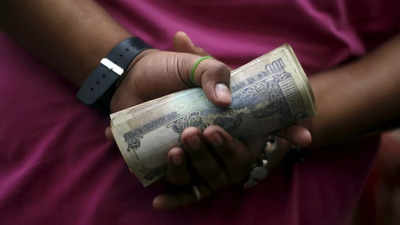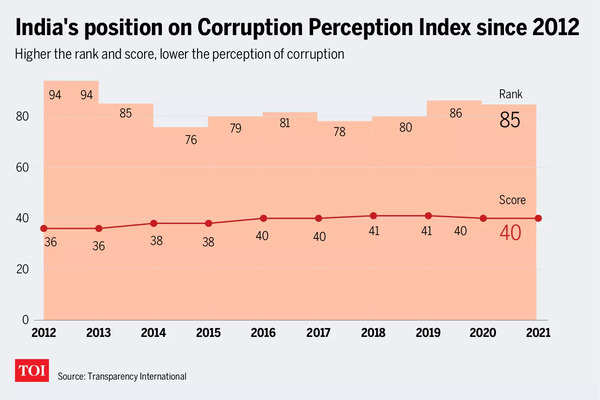- News
- India News
- Corruption index: India cleanest in South Asia, Pakistan slides steeply
Trending
This story is from January 25, 2022
Corruption index: India cleanest in South Asia, Pakistan slides steeply
The 2021 Corruption Perception Index by Transparency International places India 85th on a list of 180 countries, one position above last year. The latest Transparency International Corruption Perception Index for 2021, released Tuesday, said India was among 86% of the 180 countries the index covers that have made little to no progress since 2012. Pakistan meanwhile dropped 16 places to rank 140.

File photo used for representation
The 2021 Corruption Perception Index by Transparency International places India 85th on a list of 180 countries, one position above last year
Not much has changed about how corrupt India is perceived to be in a decade. The latest Transparency International Corruption Perception Index for 2021, released Tuesday, said India was among 86% of the 180 countries the index covers that have made little to no progress since 2012.
Topping the index this year are Denmark, Finland and New Zealand, all tied with scores of 88.With a score of 40, India ranks 85th. Its rank is a significant jump over the 94th place it was in back in 2012, but the score is only a minor improvement over the 36 it had then. Compared to its neighbours, though, it fares far better.

But the stagnation is worrying, the report said, and listed India as a “country to watch”. “There are concerns over the country’s democratic status, as fundamental freedoms and institutional checks and balances decay. Journalists and activists are particularly at risk and have been victims of attacks by the police, political militants, criminal gangs and corrupt local officials,” the report said. “Civil society organisations that speak up against the government have been targeted with security, defamation, sedition, hate speech and contempt-of-court charges, and with regulations on foreign funding.”
The Corruption Perception Index relies on sources like Freedom House and the World Bank, and surveys based on questionnaires answered by experts and businesspeople. “Corruption” includes bribery, diversion of public funds, use of public office for private gain without facing consequences, government control of corruption in the public sector, red tape, nepotistic appointments, laws for disclosure of public officia’s finances and conflicts of interest, legal protection for whistleblowers, state capture by vested interests, and access to information on government activities. The data sources are then standardised to grade countries on a scale of zero (highly corrupt) to 100 (very clean) every year.
In the Asia Pacific region, the report said, the average score remains 45 for the third year in a row. Over 70% of the region’s countries rank below 50. “Some of the region's, and the world’s, most populous countries – China and India – score poorly, as governments crush dissent and limit human rights,” the report noted. In South Asia, Sri Lanka is the only country to score lower now than it did in 2012. The other countries in India’s neighbourhood, while still scoring low, registered no change at all or minimal improvements.
“People across Asia Pacific have led mass movements calling for action against corruption, but little has changed in the last 10 years. Instead populist and autocratic leaders co-opt anti-corruption messaging to stay in power and restrict civil liberties to stop people from taking to the streets,” Ilham Mohamed, Asia regional advisor of Transparency International, said in a statement accompanying the report.
The pandemic, the report added, offered an excuse for Bangladesh, Pakistan and Singapore governments to “tighten control and weaken accountability”.
Over the past decade, smaller countries like Seychelles and Armenia have made the biggest strides in reducing corruption levels. Among larger economies, only Italy, China, Austria, UK and Argentina have improved their scores. The report flagged the backslide of “advanced economies” like Australia (from 85 to 73), Canada (84 to 74) and the US (73 to 67) over the past 10 years. Overall, 27 countries dipped to historic lows in 2021. Daniel Eriksson, Chief Executive Officer of Transparency International said, “It is the power held by teachers, shopkeepers, students and ordinary people from all walks of life that will ultimately deliver accountability.”
Not much has changed about how corrupt India is perceived to be in a decade. The latest Transparency International Corruption Perception Index for 2021, released Tuesday, said India was among 86% of the 180 countries the index covers that have made little to no progress since 2012.
Topping the index this year are Denmark, Finland and New Zealand, all tied with scores of 88.With a score of 40, India ranks 85th. Its rank is a significant jump over the 94th place it was in back in 2012, but the score is only a minor improvement over the 36 it had then. Compared to its neighbours, though, it fares far better.

But the stagnation is worrying, the report said, and listed India as a “country to watch”. “There are concerns over the country’s democratic status, as fundamental freedoms and institutional checks and balances decay. Journalists and activists are particularly at risk and have been victims of attacks by the police, political militants, criminal gangs and corrupt local officials,” the report said. “Civil society organisations that speak up against the government have been targeted with security, defamation, sedition, hate speech and contempt-of-court charges, and with regulations on foreign funding.”
The Corruption Perception Index relies on sources like Freedom House and the World Bank, and surveys based on questionnaires answered by experts and businesspeople. “Corruption” includes bribery, diversion of public funds, use of public office for private gain without facing consequences, government control of corruption in the public sector, red tape, nepotistic appointments, laws for disclosure of public officia’s finances and conflicts of interest, legal protection for whistleblowers, state capture by vested interests, and access to information on government activities. The data sources are then standardised to grade countries on a scale of zero (highly corrupt) to 100 (very clean) every year.
In the Asia Pacific region, the report said, the average score remains 45 for the third year in a row. Over 70% of the region’s countries rank below 50. “Some of the region's, and the world’s, most populous countries – China and India – score poorly, as governments crush dissent and limit human rights,” the report noted. In South Asia, Sri Lanka is the only country to score lower now than it did in 2012. The other countries in India’s neighbourhood, while still scoring low, registered no change at all or minimal improvements.
“People across Asia Pacific have led mass movements calling for action against corruption, but little has changed in the last 10 years. Instead populist and autocratic leaders co-opt anti-corruption messaging to stay in power and restrict civil liberties to stop people from taking to the streets,” Ilham Mohamed, Asia regional advisor of Transparency International, said in a statement accompanying the report.
The pandemic, the report added, offered an excuse for Bangladesh, Pakistan and Singapore governments to “tighten control and weaken accountability”.
Over the past decade, smaller countries like Seychelles and Armenia have made the biggest strides in reducing corruption levels. Among larger economies, only Italy, China, Austria, UK and Argentina have improved their scores. The report flagged the backslide of “advanced economies” like Australia (from 85 to 73), Canada (84 to 74) and the US (73 to 67) over the past 10 years. Overall, 27 countries dipped to historic lows in 2021. Daniel Eriksson, Chief Executive Officer of Transparency International said, “It is the power held by teachers, shopkeepers, students and ordinary people from all walks of life that will ultimately deliver accountability.”
End of Article
FOLLOW US ON SOCIAL MEDIA










